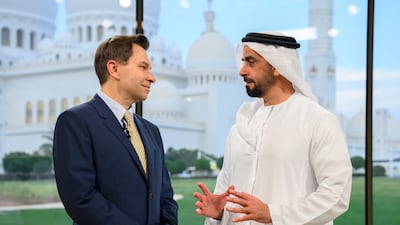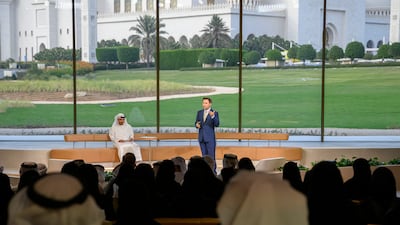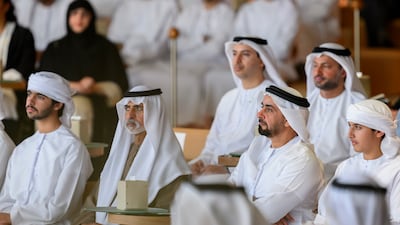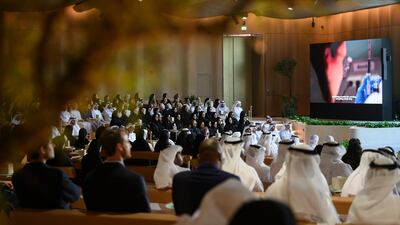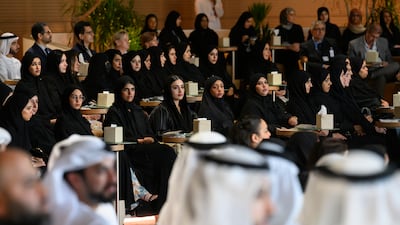A Harvard professor has said that advancements in science will soon make ageing a thing of the past.
David Sinclair, a professor of genetics and co-director of the Paul F Glenn Centre for Biology of Ageing Research at Harvard Medical School, has dedicated much of his life to understanding the ageing process and reversing what he says has been misunderstood as an inevitable part of life.
The 53-year-old, who claims that he has reversed his own age by at least a decade, addressed the Majlis Mohamed bin Zayed on Tuesday.
The majlis lecture series is held each year during Ramadan, bringing together industry leaders and expert minds to discuss pressing global issues for society in the present and the future.
While his main advice for staying young was not revolutionary — with the main tips being exercise, intermittent fasting, a healthy diet, avoiding sugar and taking supplements — he also spoke on the science of reversing ageing, which is developing quickly.
He said that his team of 20 scientists has successfully helped old, blind mice regain their eyesight and restored some of the biological signs of youthfulness to the animals.
Harvard Medical School
Mr Sinclair and his team discovered that there is a “youth backup copy of every cell in our body” and their goal is to reactivate these cells.
“I am turning 54 soon and, like most of us, if we just look at today's medicine, someone my age has much fewer days ahead than behind them,” he told the meeting.
“And these days, the days ahead do not look very bright for someone in their 50s and certainly for somebody in their 60s, 70s and 80s.
“Today, we live in a world where reaching the age of 80 or 90, and certainly 100 is an example of disability and suffering and disease.
“I'm here to tell you that I have no doubt, based on what I've seen in my lab and in companies now emerging around the planet, that soon, certainly within the next decade, we will start to see changes in what we can achieve in our lifetimes.”
A 70-year-old will no longer have to worry about heart disease, cancer and dementia, he said, and an 80-year-old can look forward to “raising the great grandkids and contributing to society”.
“And even somebody in the 90s can look forward to many decades ahead,” he said.
The research being carried out, not only by his team at Harvard, but around the world — including the UAE — shows that change is coming in the ageing process, he said.
“It's really no longer if it's really possible but a question of when, and the faster we go, the faster we go in terms of development of technology,” he said.
Mr Sinclair compared ageing to a scratched CD, where all the information is not lost but is instead corrupted.
“If there's one thing that you remember today [let it be] that ageing is a disease, and that my lab is working on a cure for that disease,” he said.
“Now, does this mean we're going to be immortal? No, not yet. But I can say that the idea of getting old and sick when you're 80 or 90 will soon be history.
“Ageing is simply a loss of information. It's not just damage or junk, accumulating. It's as though the software of the body gets corrupted. And if I'm right, you can restore youth in an old person.”
Many of his team's experiments carried out on mice have shown successful results. The goal, he said, is for humans to stay alive until the science arrives.
He said ageing must be treated separately from age-related diseases such as dementia or Alzheimer's. By treating ageing as a separate disease, he believes other age-related problems can be cured.
“The way to look at it is that we can develop medicines that can be given to a patient to revive their memory, but it will also revive their entire body,” he said.
“The diseases that are incurable today, like Alzheimer's disease, I believe will soon be curable in my life.
“It's very easy to cure Alzheimer's in animals. All we do is we make the brain young again. So I think this is a better way to look at it is that diseases are part of ageing, and that we should study ageing like a disease.”
The supplements he recommends people to take to remain young — which he takes on a daily basis — are NAD boosters; Berberine and Metformin; Resveratrol and fisetin; Spermidine; Vitamin D3 and K2; Vitamins B6, 9, 12; Alpha lipoic acid and Omega 3, 6 and 9 fatty acids.
However, he warned against making any sudden changes to lifestyle.
“If you try to do everything I do tomorrow, you will fail. I believe you need to change things slowly,” he said.
“So try to eat a small breakfast or skip lunch or try to walk more — these small changes will eventually compound and you can get up to 15 years of extra life just by doing these simple things.”
He showed a picture of his 83-year-old father rafting and said he would hopefully be a real-life example of how you can reverse the ageing process.
“My hope is that my father can serve as a shining example of what humanity can achieve, which is that in your 80s, you can begin a new career, you can be productive, you can learn a new instrument and new language and look forward to another 30 years of life,” he said.
“Ageing truly is reversible. This disease that we all have, we can slow it down and we can even reverse it.
“In the future when this happens, we will wonder why we didn't do it before and why did we ignored ageing until now.”
